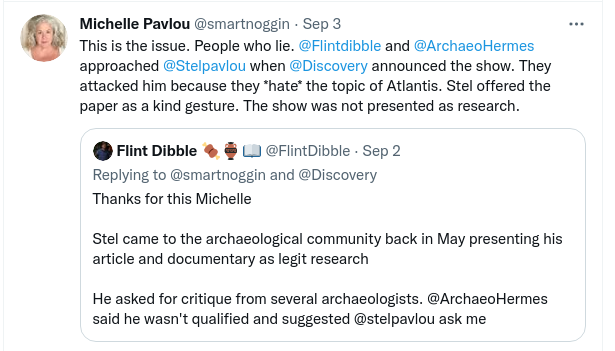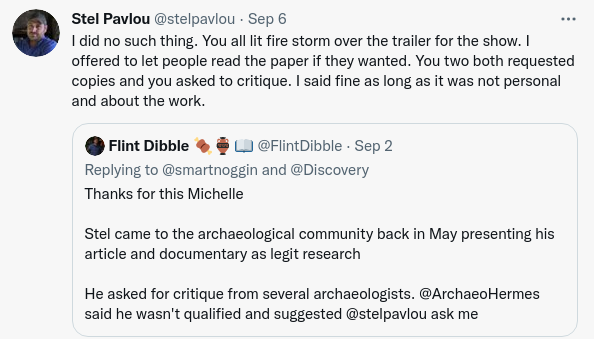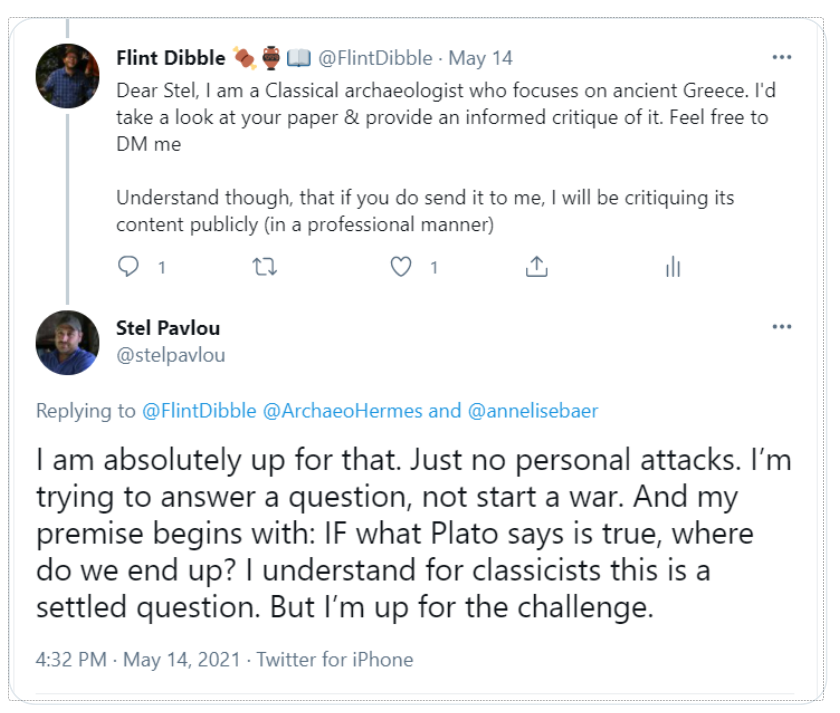
Folks behind yet another pseudoarchaeology show on The Discovery Channel seem not to like reasoned criticism from a real archaeologist.
I’ve been wanting to write something about the new Discovery Channel television show “Hunting Atlantis” for a while. I just couldn’t bring myself to actually watch it until now. And now that I’ve watched all six available episodes, swallowing back some of the little bits of vomit that came up here and there while sitting through them, I realize that I can’t really say anything that hasn’t already been said.
So, instead, I’d like to take a brief moment to point you to Flint Dibble!
Yesterday, I noticed some Twitter friends reposting some interesting tweets from Flint. Until now, I hadn’t known about Flint’s work, so I’m glad to discover it. If you haven’t read his Twitter stuff, I recommend it. His threads are nice, brief explanations of different aspects of archaeology, but I was especially taken by his threads on “Hunting Atlantis.”
Apparently, Stel Pavlou, one of the two hosts of the show, agreed to let Flint Dibble review his article, “Dating Atlantis: How Manetho helps address the Critias 108e problem” scheduled for future publication in the online magazine, The Journal of Archaeomythology. Which Flint Dibble definitely did. Much to the dismay of Stel’s spouse!

She went on with a thread of a dozen or so tweets that ranged from “momma is sending you to your room” to how she’s proud that her husband is bringing science back to The Discovery Channel.
It was a very strange read. Click it if you dare!
Not to be outdone by his spouse, Stel also had an objection

Dibble quickly pointed out that not only was the forthcoming paper announced by Stel, but that he was clear about his intent to review the content. Stel just asked that it not be personal. The problem is, when you have such a grandiose conclusion to which you only seek data that are supportive, any critique of that conclusion comes off as a personal attack because you have so much invested in it personally. This is the problem with pseudoarchaeology and pseudoscience in general.
Here’s a tweet that shows Flint Dibble’s intentions back in May and Stel’s agreeing to be “up for the challenge.”

So what did Flint Dibble write that was so upsetting to Stel and his wife?
Flint writes, the “provocative claim at the center of Stel’s paper and TV show is that we have dated the myth of Atlantis wrong. In Plato, the character Critias claimed it happened 9000 years before him (ca. 9300 BCE); Stel claims to redate this story to around 5000 BCE.”
Dibble gives Stel credit where it’s due. He notes that the paper was “cleverly researched” and the “citations and footnotes are, for the most part, accurate.” But Dibble also points out the cherry picking that occurs so frequently with pseudoarchaeological positions as well as the existence of unfounded statements that lack citation. As example, Dibble draws on Stel’s claim that the circular layout for a city was “entirely unknown in Plato’s time when urban planning across the known world had long settled on grid systems from at least 2,500 BCE onwards.” This quote is ostensibly from the paper Dibble was provided by Stel Pavlou, for which I don’t have a copy. However, he says as much at around 6:23 in his talk with the Explorers Club. Dibble shows that circular and rounded settlements that were even fortified and with ditches were in fashion prior to Plato’s time (360 BCE) as well as before 2500 BCE.
Flint Dibble also makes a very good argument about Plato’s description of Athens at the time of Atlantis and how, if we’re to accept that story his character Critias was telling about Atlantis is true, then we must accept that his description of Athens is therefore true. Which it isn’t by all objective, archaeological evidence. It’s a very well presented point that I urge you to read and tuck away for that future discussion with a proponent of Atlantis.
Like I said, I didn’t read the paper and it isn’t yet published. The open source journal that will be publishing it isn’t exactly one that includes peer-review and it has a very low journal impact factor, meaning it gets relatively few citations from the academic world. I can see how an article of obvious contention might appeal to such a journal since it’s bound to attract some citations, even if they are critical.
Watching the TV Show
Some common themes for Atlantis proponents include: 1) starting with conclusions; 2) moving goal posts when data aren’t working out; and 3) careful cherry picking. I’d be interested to see if Stel Pavlou’s paper includes any or all of these, but I suppose I’ll wait and see like the rest of us.
In the meantime, however, I did watch the TV show. And I found it disappointing. Jess Phoenix, for her part, appeared to really want to do good science and seemed genuinely interested in archaeology. She’s a geologist and many of her insights were actually interesting. But Stel clearly begins the 6 episode season with a conclusion: “I’ve been obsessed with Atlantis all my life,” he say’s during the show’s intro. And that Critias was a real person who was talking about a real place is the conclusion he begins with. I don’t think there was a single mention of falsifying that as a hypothesis. In fact, it wasn’t even treated as a hypothesis. This was a matter of fact that the show is built around.
Changing the chronology from 9300 BCE to 5000 BCE seems completely baseless. Sure, he said he’s doing it because of the way Egyptians kept time based on King’s lists, etc., but so what? Plato wrote the Critias and Timaeus dialogues at around 360 BCE. In Greece. He was Greek. It seems to be a stretch and a moving of the goalpost to me.
And many a cherry was picked in the six episodes. Mostly it was running around the Aegean and Mediterranean looking at cool sites trying to fit data to Stel’s conclusions. Overall, it had that “Oak Island” and “Expedition Unknown” vibe to it with the sensational cut-scenes, trashy pre-commercial hooks, and hyperbole-laden “discoveries” that were probably completely scripted. Oh, spoiler alert: they did not find Atlantis.
Pavlou’s wife wrote tweets about how science was being returned to The Discovery Channel, and so on. If this is the kind of “science” that we can expect, please keep it. Will it inspire kids? Maybe. I started out heavily steeped in pseudoscience and pseudoarchaeology and all that ancient astronauts crap as a kid. I read Chariots of the Gods? and books on the Bermuda Triangle and all sorts of nonsense until I got turned on to Carl Sagan and Richard Feynman at a young age.
The sad truth is this (and this is the part that probably upsets the Pavlous): pseudoarchaeology like Atlantis connects to racism in so many ways. Sure, there’s no racist intent in Pavlou’s show. And I’m sure he’s mortified–offended even–to have it mentioned in the same breath as his show. But racist nuts like Robert Sepehr and others love to piggyback this sort of thing as they go on about the Aryan race and how white people are responsible for everything good in the world. Nazis used Atlantis mythology to try and prove the superiority of the Aryan race. And so on. I recommend Stephanie Halmhofer’s article, The Harmful Pseudoarchaeology of Mythological Atlantis for more details.
So, where can you read Flint Dibble’s reviews and threads?
Hopefully I’ve linked them correctly below.
Pseudoarchaeology and fake history causes real harm in our society.
Featured image courtesy of Max Pixel
Want to find great evidence for Plato’s story? How’s about finding Atlantis’ contemporary as per Plato – ancient Athens? Athens location is known, it should be easy to find the remains of 10,000 year old Athens. What, there is no evidence? Just say that part of Plato’s story is fake but everything else is true. Right.
Hi Carl, does the recent discovery of footprints in New Mexico that push back the timeline of arrival of humans in North America change the way you look at the book ‘America Before’? I know some of the claims in that book go too far but i seem to remember that a lot of the criticism was around the lack of attention to alternative arguments / viewpoints to those that supported the claim. Now the claim has been proven, will you follow the appropriate scientific approach of re-visiting your previous criticism. You were very dismissive of this book and it appears that you were wrong? If not, why not? Posting here as i know you will see it.
Not at all. All my criticisms of Hancock’s America Before still stand.
It was never about whether “things keep getting older” as he likes to state. In fact, that 23,000 year date really isn’t new. It’s new for that particular site with that particular set of features (assuming it continues to withstand scrutiny–and I hope it does), but there are sites around the North American continent that are in that ball park already.
The critiques I had with Hancock are mostly related to a few points. He shows data that are convenient for him, largely misrepresenting those data or neglecting to provide any skepticism–like with the claim of 130,000 year old hominid in California (the Cerutti Mastodon site). He likes this claim because it was made by a real scientist and it’s in line with his schtick. But he doesn’t care to explore arguments against it beyond superficially acknowledging them enough to point his finger at an alleged “orthodoxy.” The reality is that skepticism and challenges to extraordinary claims are a vital part of scientific discovery and Hancock should be cheering those that would seek to falsify hypotheses. Instead, he erects strawman arguments about an imagined “orthodoxy” of “mainstream” scientists that seek to be gate keepers and keep out discovery.
Nothing could be further from the truth. In fact many if not most dissertations of young archaeology students seeking their graduate degrees are comprised of those that seek to overturn established conclusions and methods in archaeology. This is contrary to the very theme of Hancock’s America Before.
But, most of all, the finds in New Mexico do nothing to erase the fact that Hancock ends America Before with the claim that an unknown, highly advanced, globally-reaching civilization expired on our planet so long ago that all physical evidence of them is erased. Yet they passed on their knowledge to modern civilizations. How to build pyramids, cut stone, etc.
How did they pass it on according to Hancock? Magic.